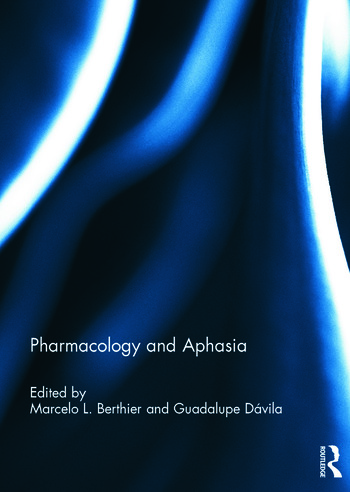This short collection of essays, originally published as a special volume of the journal Aphasiology, is a surprisingly optimistic read. Notwithstanding the fact that my favourite sentence in its 138 pages (on Page 1, as it happens) refers to the addition of ‘complimentary interventions’ (c.f. complementary) to traditional forms of rehabilitation for syndromes of language impairment, the volume as a whole is serious-minded and measured in its handling of content which is somewhat outside the mainstream of Clinical Neurology. Of course, there are no definitive answers, let alone any offer of a magic potion to restore speech. However, there are several pointers to potential drug treatments that might complement current approaches, and perhaps mollify the turn of phrase of the most uncomplimentary therapist.
There are seven chapters in all, including a general introduction. It will hardly come as a surprise that the drugs reviewed are the usual suspects of current practice in the neurodegenerative disease. Thus we have the dopaminergic drugs, as well as those acting on the cholinergic system, and memantine. It is a little disconcerting for those who have learnt to avoid ergot derivatives because of their fibrotic side-effects to see bromocriptine commended for its potential to improve the success of speech therapy after stroke. I must also admit to becoming a little uneasy as I read at the very idea of chemically enhancing the processes of cognition! Might clinical evidence of efficacy form part of an argument to justify the use of similar approaches in the healthy? How soon would this become the norm, and not the exception? How long would it be before its wisdom could truly be determined? But such concerns are probably an indulgence – certainly, any patient with aphasia, struggling to make progress with speech therapy, could be forgiven for thinking so.
The first of my points of optimism is best encapsulated in the extensive tabulation of published research on pharmacotherapy in aphasia in the second chapter: this extends over eight whole pages. And this despite the fact that aphasia, as a focal cortical syndrome, must be a less promising object of chemical amelioration than syndromes affecting the function of distributed brain systems (e.g. impaired memory) whose ascending and descending cortical- subcortical projections, make use of particular neurotransmitters.
The second point of optimism was to see the important role for the study of very small numbers of patients in the development of novel treatments, when this is done with appropriate rigour and transparency. Of course, there is no doubt that randomised controlled trials are at the epicentre of evaluating medical intervention, but it seems to me that an uncritical acceptance of the RCT approach is unhelpful in numerous neurological conditions. Even in diseases that are quite common, such that suitable numbers may accrue for an RCT, the variety in the manifestations of brain diseases, from one patient to the next, seriously undermines analysis of any but the crudest of outcome measures. The result is the appearance of RCTs, impressive for the sheer amount of work involved, but facile in their conclusions. While collaborative approaches across centres and across borders must form part of the response to the challenge of evaluating treatment in rare presentations, and in rare forms pathology, I think that painstaking study of prototypical cases (such as the chapter by Galling and colleagues in this book) ought not to be discounted.
Might we find a 21st-century therapeutic equivalent of Paul Broca’s Tan, whose misfortune taught us so much about the neurological basis of speech? I am prepared to indulge my sense of optimism that there could be a patient with the good fortune to be an early recipient of a drug that substantially reduced the symptoms of aphasia, whose doctor documents the process sufficiently well to provide guidance for the rest of us.
ACNR 2015;15(2):22. Online 2/07/15

